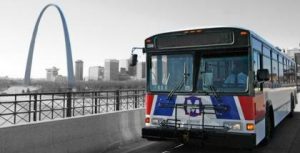InTrans / Sep 16, 2015
Looking at the sustainability of mass transit in St. Louis and Chicago

A research project led by Ray Mundy of the University of Missouri-St. Louis (UMSL) is examining the financial sustainability faced by most United States transit systems.
The study is determining the sustainability of the mass transit systems in two Midwest cities, the St. Louis Metro and the Chicago Regional Transit Authority. Researchers also will examine mass transit alternatives implemented in various countries and will suggest solutions, says Mundy, the John Barriger III Professor of Transportation Studies and director of the Center for Transportation Studies at UMSL.
“We need mass transit, especially in urban areas,” Mundy says. “However, pieces of the current funding model are not sustainable.”
Public transportation funding continues to require federal, state, and local tax reserves to try to address the needs of urban communities. In addition, costs keep rising. Mundy cited National Transit Database figures indicating that total mass transit federal funding increased 72.5 percent from 2002 to 2012.
Mundy wrote, “Caught between a looming deficit and failure to attract consumers exists a web of inefficient operations, financially unsustainable funding segments, and an inability to adequately modernize transit system offerings. Despite all the good intentions devoted to funds contributed, further investments are now contributing toward an unsustainable drain on local community resources.”
Some of the challenges faced by urban transit systems include stagnant ridership partially due to the conveniences of automobiles, high labor costs, and an aging infrastructure.
The researchers have suggested several viable alternatives, such as utilization of public-private partnerships, reducing costs and increasing revenue, contracting out transit services to private parties, use of competitive tendering of routes, an introduction of competition for innovative services, and strategies to rein in growing debt.
Inefficiencies and high labor costs are the biggest challenges faced by mass transit. Mundy’s team is looking at alternatives to current mass transit funding that will allow transit systems to pay off their debt and bring innovation to their business. “We must find a way to stop the bleeding and make funds available to private enterprises.”
The overarching goal, Mundy says, “is to implement sustainable mass transit options without further burdening federal, state, or local government taxpayer funds.”
Successful and scalable examples of ways to improve transit sustainability, Mundy says, are already in place around the globe and “promote an era of responsibility” between public and private mass transit sectors. “Although still a work in progress for some cities, the partnering between government infrastructure and private investors supports a future of flexibility, accountability, and profitability for passenger transportation in growing urban populations.”
The Midwest Transportation Center at Iowa State University provided support for this project.